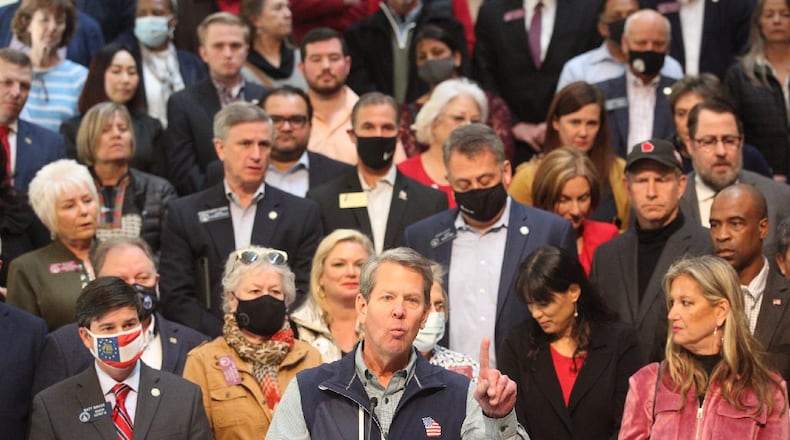It’s disorienting as an Atlantan to see the city’s business community and the state’s political leadership at each other’s throats the way we did this past week.
The alliance that has historically solved many of the city’s problems seems to be making them worse these days, especially on the question of the state’s sweeping new election law.
Senate Bill 202, the legislation in question, began as a hammer and ended as a broom, modified through nips and tucks to avoid overtly clobbering minority voters to now merely sweeping less committed voters to the side.
Sunday voting survived and even expanded in some counties. Out-of-precinct provisional voters did not. Secretary of State Brad Raffensperger got a huge demotion, while counties have been put on notice that decisions in elections may not be their own.
The effect of most of the dozens of other changes may not be fully understood until voters and counties try to follow them in 2022.
After an election that was upheld by a machine recount, a hand recount and countless challenges, the original sin of the process remains the fact that Republicans have never made the case, even to themselves, that changing the state’s voting laws was even necessary in the first place.
Along for the ride through all of it have been Georgia businesses, including Coca-Cola and Delta Air Lines, working behind the scenes to narrow the scope of SB 202 and putting out ho-hum statements about it when it passed.
Coca-Cola and Delta’s moment of truth came nearly a week after Gov. Brian Kemp signed it into law under a portrait of a Georgia plantation, with both companies’ CEOs stepping out to absolutely rip the new law as “unacceptable.”
Within 24 hours, Major League Baseball announced that it would move this summer’s prized All-Star game out of Atlanta to demonstrate its values.
But what if the two companies and the MLB had spoken out as forcefully before the legislation was signed into law as they spoke after it was a done deal?
A source inside Kemp’s office said the governor never heard from Major League Baseball during the process until after it announced its boycott of the state.
There’s no way to know for sure whether the corporate titans could have saved GOP legislators from themselves. After all, Donald Trump has spent the past six months whipping his Georgia supporters into a fact-free election-fraud frenzy that a more moderate bill may not have satisfied.
But advanced warnings would have at least given Kemp and company the cover of expected consequences. And it’s worked as a tactic, both publicly and privately, between business and political leaders in Atlanta for decades.
The alliance between the city’s business, civic and political leadership is nearly always credited with moving Georgia forward during and after the civil rights era, while so much of the Deep South stayed stuck in the past.
It was Robert Woodruff, then the head of Coca-Cola, who famously brought Atlanta’s white elite together to celebrate the Rev. Martin Luther King Jr.’s Nobel Peace Prize in 1964.
Political and business leaders made Hartsfield-Jackson International Airport’s success possible. And the 1996 Olympics.
In 2000, in the last days of the legislative session, the National Collegiate Athletic Association wrote a letter to then-Gov. Roy Barnes, warning him that future college championships in Atlanta would be in danger if he failed to change the Georgia state flag.
“The issue of concern is elements of the Confederate emblem in the Georgia state flag,” Cedric Dempsey, the NCAA president, wrote in a letter to Barnes as he asked for an update on any plans Georgia had to redesign the flag.
Attached to the letter was a list of every NCAA championship that had already been awarded to Georgia in the future, including the 2003 Women’s Final Four, as well as those that could be, like the 2007 Men’s Final Four regionals.
“I will never forget the day that letter came in,” said Bobby Kahn, Barnes’ chief of staff. “I had no idea how powerful and active the NCAA was on these issues. Until then.”
Along with rumblings about the flag that lawmakers had heard in their districts, the NCAA letter, complete with the possibility of a boycott of the state economy, convinced Barnes and his team that the flag needed to change sooner rather than later.
In January of 2001, legislation was readied with Democratic leaders, including Rep. Calvin Smyre, D-Columbus, and it passed on the last day of the session.
Plenty of other contentious debates have followed, with Georgia businesses making their stances known publicly and forcefully.
In 2016 and 2017, Coca-Cola, Home Depot and Delta came out against the “religious liberty” bill like the one that had cost Indianapolis the Final Four tournament in 2015.
Gov. Nathan Deal vetoed the Georgia bill in 2016 — and warned lawmakers he would do it again in 2017 if it got back to his desk.
All these efforts worked because lawmakers knew the stakes before they finished the fight.
Would Kemp and Republicans have done what they did if they’d known what lay ahead? Maybe.
On Saturday, they held a defiant press conference to slam Delta, Coca-Cola and baseball for caving in to cancel culture. It was a short-term sugar high of unity for a party that’s been divided so thoroughly by Trump.
They’re now standing together against businesses, on the opposite side of a fight for the civil rights King died for, defending a political lie about the past instead of leading Georgia forward into its future.
About the Author
Keep Reading
The Latest
Featured




